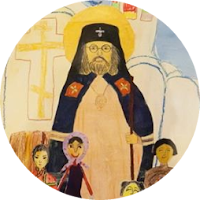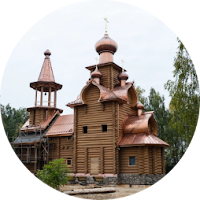A New Year’s Guide for Orthodox Christians: Interview with Father Demetrios Antonopoulos
Hello,
Father. Before we discuss our theme for today, I know you are relatively new to
the Greek Orthodox Metropolis of Toronto (Canada), so can you therefore tell us
a little about yourself?
- I was born in Athens and grew up both
there and in Kalamata. I desired to study abroad and was fortunate to go to
Germany when I was 18 years old. There I focused on learning linguistics,
German philology and Modern Greek studies and language.
Upon my return to Greece, I went to the
Agarathos Monastery in Heraklion, Crete. It was at this Monastery (dedicated to
the Most-holy Virgin Mary) where I was tonsured a monk, ordained a Deacon
(2006) and a Priest (2008) by Metropolitan Evgenios of Rethymnon and
Avlopotamos.
(Actually, two recognized Saints have
come out of the Agarathos Monastery: Meletios Pigas and Cyril Loukaris.)
Finally, I have earned a Master of
Divinity from Holy Cross in Boston and, as you know, now serve as the parish
priest at St. Nicholas in Toronto.
It is
customary among many to set personal goals for the New Year. How should we as
Orthodox Christians approach the tradition of setting such resolutions?
- When I lived in Germany I knew people
who every January would want to change something for the better or stop doing
something harmful, like smoking. If you examine New Year’s resolutions, you
will see that people commit to them out of a desire of developing themselves
towards good. However beneficial this tendency may be, though, it does not
mirror the Orthodox life.
This is because the change should be
right now since we are at the risk of death every day. As one hymn to the Holy
Trinity states, “The Judge [Christ] will come suddenly, and the deeds of each
will be laid bare.” Given this, the change we often seek may be late or indeed
never come.
Regrettably, modern society is often
dominated by consumerism and people are less concerned about the correct way of
living; and, because of this, they find reasons to push change into the future,
including making New Year’s resolutions.
But as I just mentioned, it is vital
that we continuously try to change our habits in a God-pleasing way.
One
habit I think many of us, including myself, need to examine is our going to
Church since many times we go out of a sense of duty (e.g., Christmas, Pascha,
for a wedding or funeral). How do you suggest we approach attending the Divine
services and, briefly, why is this important?
- I agree that it is a fact many people
nowadays go to Church just for this reason. Our faithful need to better
recognize the real meaning and depth of the liturgical life of the Church since
we often lack knowledge about the beneficial role of the Church in our life.
Partaking in the liturgical life of the
Church helps one prepare to participate in the Salvific plan of God. Every
Church service, but predominately the Divine Liturgy, encapsulates all of our
theology. On the other hand, however, not partaking in the liturgical life of
the Church disrupts one’s voyage towards a saintly life, that is, towards a
life in union with Christ.
If we go to Church, read Holy books and
try to imitate the lives of the Saints and, most of all, to follow the life of
Christ, (which takes place in the Mysteries of the Church and in the entire
Creation), then the need to make New Year’s resolutions, for example, will be
non-existent because we will already be on the correct road to change which
offers the experience of the Mystery of Christ.
We must go to Church because this is
the only way to have a real Christian life. As Saint Cyprian wrote, ‘A person
cannot have God as his Father if he does not have the Church as his Mother.’
This
provides a good segway to talk about repentance and confession. We know that
the Holy Fathers – and Mothers – of the Church stress the need for both. What
advice would you give to someone who has never been to confession and is
perhaps thinking or wanting to go?
- Let me begin by saying that in the
Orthodox Church repentance and confession belong to the same Sacrament.
This Sacrament has existed in the
Church from the time of Christ. It was He who gave authority to His Apostles to
forgive sins: “Receive the Holy Spirit. If you forgive the sins of any, they
are forgiven; if you retain the sins of any, they are retained” (John 20:
22-23).
I should stress here the strong
connection between confession and repentance because it is often observed that
while we may confess, we many times do not repent.
We should remember the Greek word
Metanoia, which means “change of mind” or lifestyle towards God. It is through
the Sacrament of confession that one introduces himself – based on his/her own
free will – to God, allowing him/her to get known by Him.
By participating in this Sacrament we
begin to work with God, leading us to restore our relationship with Him through
a process of synergy (or cooperation) between God and man. The Theanthropic
synergy is an essential characteristic of the Christian life. When man works
together with God, God works together with man (I Cor 3:9). Nothing good
happens in a Christian life without God’s grace. When one offers his free will
and God His Grace, this cooperation between man and God builds a Christian
personality. Therefore, Christian virtue is based on synergy.
Confession prepares us for salvation
which occurs through God’s grace but which is also dependent on our
participation through our free will. If we start participating in this
Sacrament, we will begin to figure out the real meaning of God in our life,
leading to an enhanced understanding of the Salvific mystery.
Apart
from going to Church and partaking in its Mysteries, what resolutions or
changes can we make in our daily routine to live a more Orthodox Christian and
Christ-centred life?
- As I have mentioned, the participation
of the faithful in the sacramental life of the Church is necessary but it is
not enough. After we depart from Church, we need to depart with Christ in our
hearts since the centre of our life should be Him.
While we receive His precious Body and
His precious Blood in the Divine Liturgy, we should bear Him in mind every day.
How can we do this? Through prayer, through forgiveness, by showing love to one
another and by keeping the name of Jesus Christ in our heart and in our mind.
We have to find reasons everyday to
love and to remember God. If we remain silent and think about the creation of
the world, we will be better able to see and experience God. Moreover, if we
have the sincere desire to understand God, He will reveal Himself to us.
The working of the world is a kind of
Divine Liturgy since all creation glorifies God. We are therefore exposed
everyday to God’s mercy and to His grace – the only thing left for us to do is
to be active participants!
Thank
you very much, Father.
- Thank you. May God bless us always and
keep us close to Him.
By
Evagelos Sotiropoulos
Source: http://www.gometropolis.org/clergy/clergy-interviews/interview-with-fr-demetrios/










































